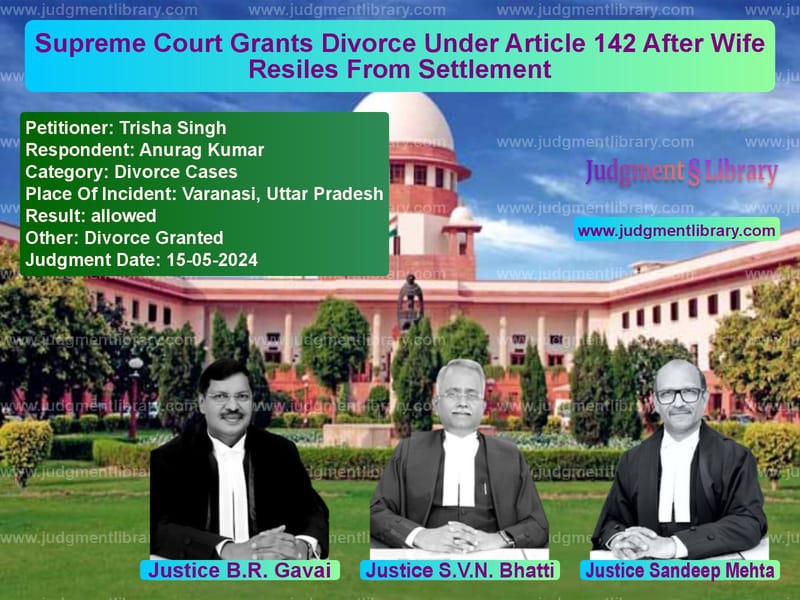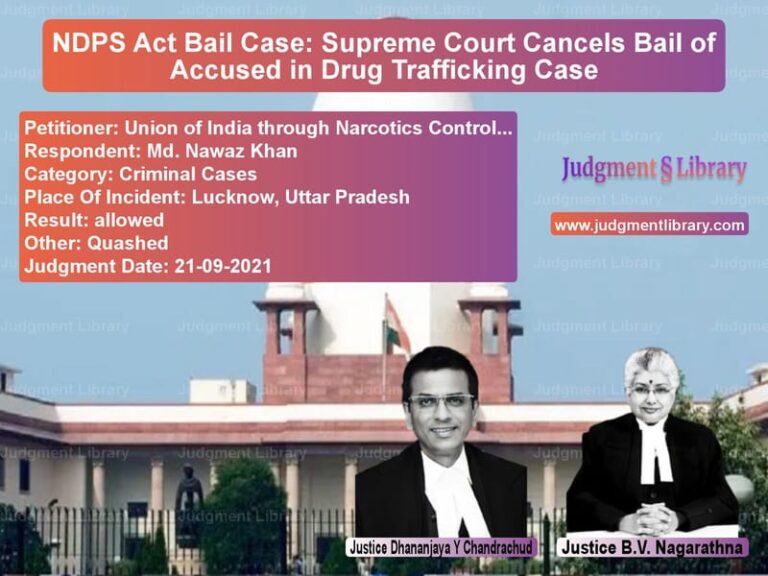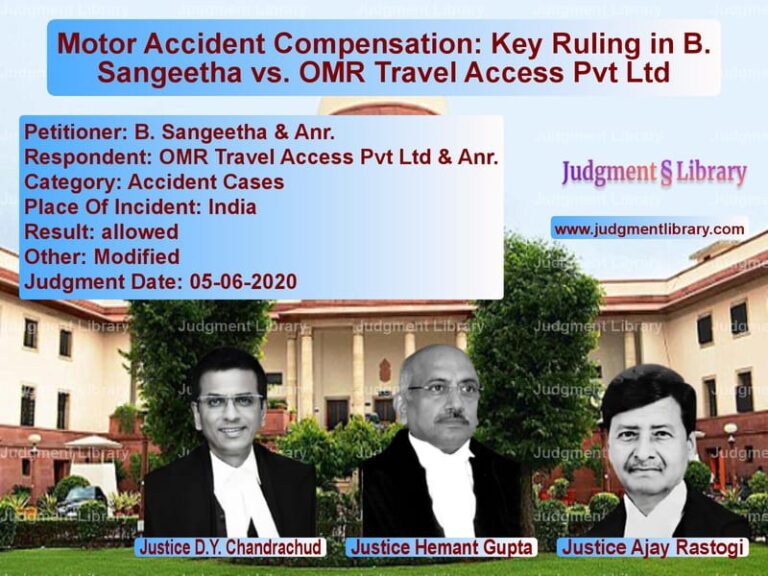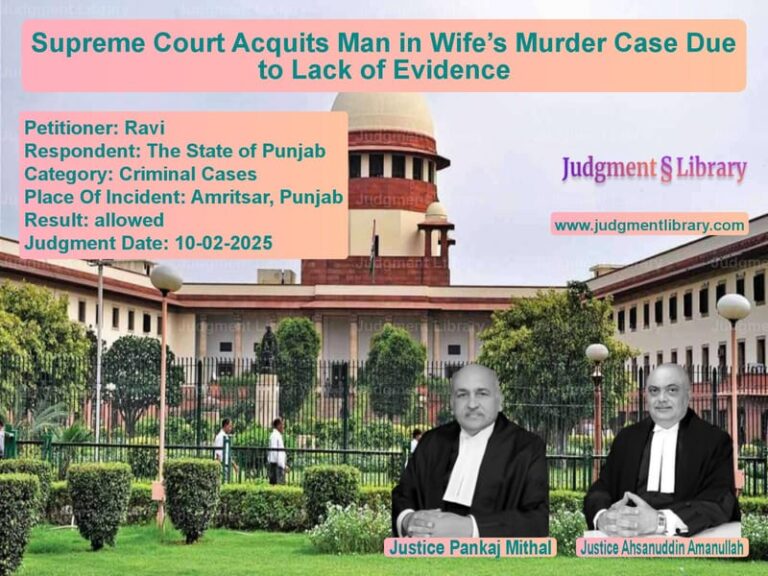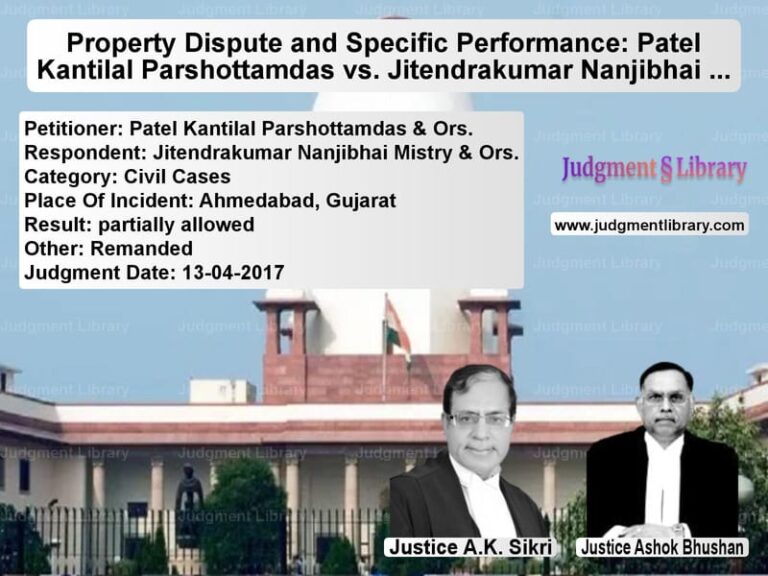Supreme Court Grants Divorce Under Article 142 After Wife Resiles From Settlement
The Supreme Court of India recently ruled on a matrimonial dispute in the case of Trisha Singh vs. Anurag Kumar, wherein the petitioner-wife initially sought a transfer of the husband’s restitution of conjugal rights case but later reached a settlement. However, after receiving partial alimony, the petitioner-wife resiled from the agreement, leading the Supreme Court to exercise its powers under Article 142 of the Constitution of India to grant divorce and ensure the enforcement of the settlement terms.
Background of the Case
The dispute arose when the petitioner-wife, Trisha Singh, filed a transfer petition before the Supreme Court, seeking to move Matrimonial Case No. 2172/2022, filed by her husband, Anurag Kumar, under Section 9 of the Hindu Marriage Act, 1955, from Varanasi, Uttar Pradesh to Pune, Maharashtra. During the proceedings, both parties agreed to a settlement through mediation at the Supreme Court Mediation Centre.
Chronology of Events
- July 26, 2023: The transfer petition was dismissed for want of prosecution.
- August 21, 2023: The Supreme Court restored the transfer petition and referred the matter for mediation.
- February 26, 2024: The parties signed a settlement agreement, agreeing to a full and final alimony payment of Rs. 1.15 crore.
- April 23, 2024: The respondent-husband withdrew his restitution of conjugal rights case as per the agreement.
- May 2024: The petitioner-wife resiled from the settlement despite having received Rs. 50 lakh and refused to abide by the agreed terms.
Legal Issues Considered
The Supreme Court examined the following legal questions:
- Whether a party can unilaterally resile from a settlement reached through mediation.
- Whether the Supreme Court can enforce the settlement and grant divorce under Article 142.
- Whether the petitioner-wife’s conduct amounted to an abuse of process.
Arguments by the Petitioner-Wife (Trisha Singh)
The petitioner-wife’s counsel withdrew from the case, citing a lack of instructions from his client. However, the Court noted that:
- The petitioner-wife had voluntarily entered into the settlement and accepted partial alimony.
- Her refusal to comply with the agreement was without legal justification.
- The respondent-husband had already withdrawn his restitution of conjugal rights case based on her assurances.
Arguments by the Respondent-Husband (Anurag Kumar)
The respondent-husband, through his counsel, contended that:
- He had honored all terms of the settlement, including withdrawing his matrimonial case and paying Rs. 50 lakh.
- The petitioner-wife’s conduct was unfair and prejudicial to his interests.
- He was still willing to abide by the settlement terms and make the remaining payments if the marriage was dissolved.
Supreme Court’s Judgment
The Supreme Court ruled in favor of the respondent-husband and exercised its powers under Article 142 of the Constitution to grant divorce, stating:
“It is manifest that there was a clear undertaking by the parties before the Mediator that they shall part ways peacefully. The conduct of the petitioner-wife is clearly recalcitrant inasmuch as she has disregarded the terms and conditions agreed before the Mediator.”
- The Court found that the petitioner-wife acted in bad faith by accepting partial alimony and later refusing to comply with the agreement.
- The settlement agreement was a binding contract, and unilateral withdrawal was impermissible.
- The Court granted divorce and directed the respondent-husband to make the remaining payments as per the schedule agreed upon.
Impact of the Judgment
The ruling has significant implications for matrimonial disputes:
- Enforcement of Mediation Settlements: Parties cannot resile from agreements reached in court-referred mediation.
- Judicial Powers Under Article 142: The Supreme Court can grant divorce if parties have irretrievably broken their marriage.
- Fairness in Matrimonial Disputes: The ruling prevents misuse of legal proceedings for financial gain.
Conclusion
The Supreme Court’s decision in Trisha Singh vs. Anurag Kumar reinforces the sanctity of mediation settlements and the principle that agreements reached through judicial forums must be honored. By granting divorce under Article 142, the Court has ensured fairness and prevented injustice arising from a party’s unilateral withdrawal from a settlement.
Petitioner Name: Trisha Singh.Respondent Name: Anurag Kumar.Judgment By: Justice B.R. Gavai, Justice S.V.N. Bhatti, Justice Sandeep Mehta.Place Of Incident: Varanasi, Uttar Pradesh.Judgment Date: 15-05-2024.
Don’t miss out on the full details! Download the complete judgment in PDF format below and gain valuable insights instantly!
Download Judgment: trisha-singh-vs-anurag-kumar-supreme-court-of-india-judgment-dated-15-05-2024.pdf
Directly Download Judgment: Directly download this Judgment
See all petitions in Alimony and Maintenance
See all petitions in Mutual Consent Divorce
See all petitions in Judgment by B R Gavai
See all petitions in Judgment by S.V.N. Bhatti
See all petitions in Judgment by Sandeep Mehta
See all petitions in allowed
See all petitions in Divorce Granted
See all petitions in supreme court of India judgments May 2024
See all petitions in 2024 judgments
See all posts in Divorce Cases Category
See all allowed petitions in Divorce Cases Category
See all Dismissed petitions in Divorce Cases Category
See all partially allowed petitions in Divorce Cases Category

